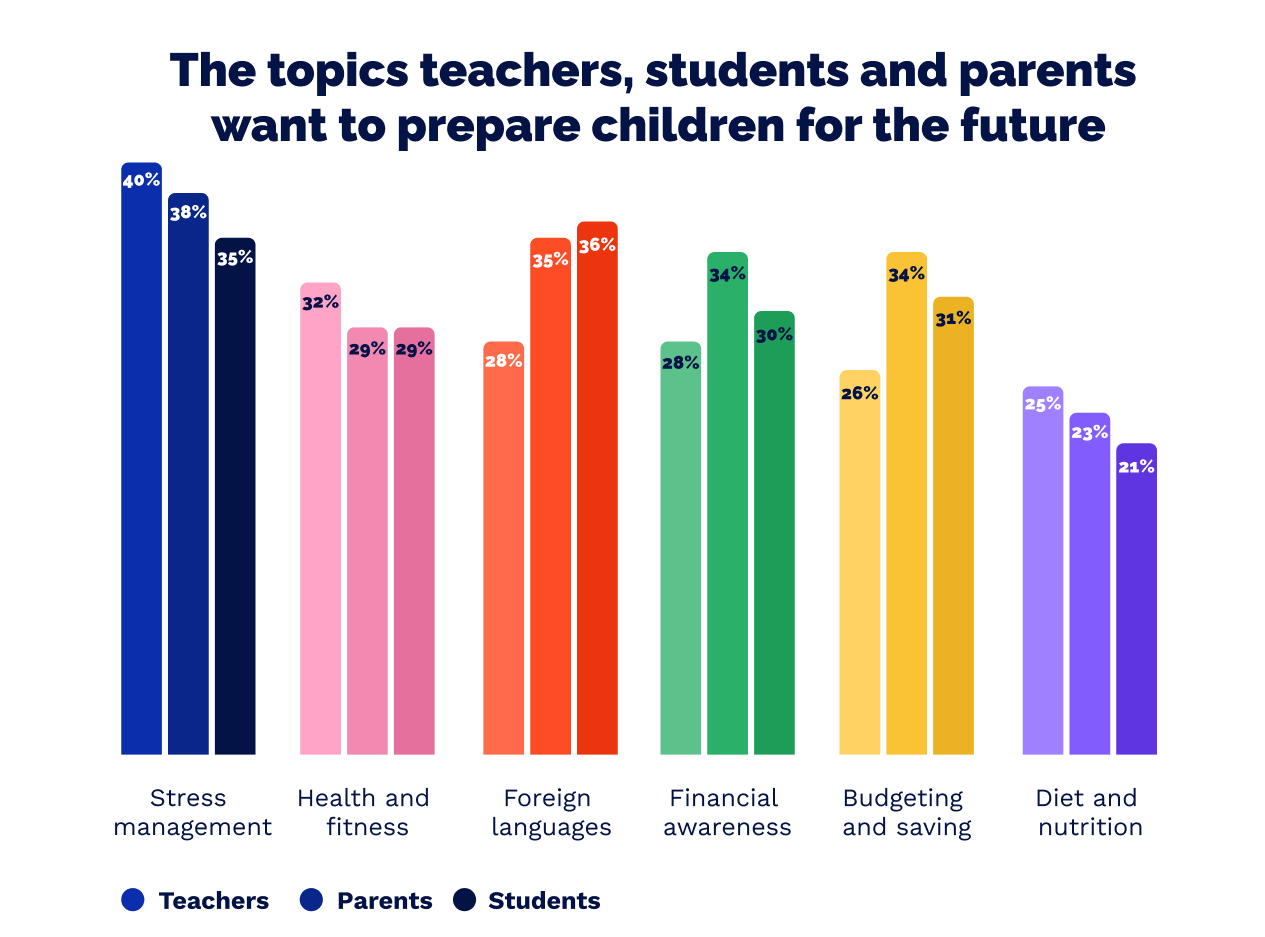- Blog
- Statistics
- Stunning Exam Stress Statistics: How Me...
50+ Stunning Exam Stress Statistics: How Mental Health Can Be Affected
Content Table
- Problems with Exams
- Exams & Assessment - The Need for Change
- Preferred Alternatives to Exams (Teacher Preferences)
- Exam Pressure on Students
- Causes of Exam Anxiety
- Effects on Student Mental Health
- Coping Mechanisms
- Stress in Education & Soft Skills
- Stress & Emotional Readiness in an AI-Powered Future
- Reducing Teacher Burden = Less Student Stress
- Support Systems
- Role of School Leaders
- Self-Care Strategies
Exam stress is one of the most pressing challenges facing students in the UK today. As academic pressure continues to build, especially in high-stakes GCSE environments, students are reporting rising levels of anxiety, burnout, and mental health concerns. Teachers and parents are sounding the alarm, while schools struggle to balance rigorous assessment with student wellbeing.
This article explores the state of exam stress in the UK, drawing on data from the newly released Future of Education Report 2025, conducted by our GoStudent partner.
🔑 Key Takeaways: Exam Stress Statistics UK
- 85% of UK students experience exam anxiety, but most don’t seek support.
- 77% of teachers report seeing anxiety issues in Year 11 students.
- 91% of teachers believe students worry too much about future outcomes.
- 28% of students have been withdrawn from GCSE exams due to stress.
- Parents and teachers want schools to teach stress management and soft skills.
- 84% of UK teachers support replacing traditional exams with simulations.
- Only 14% of students receive revision support from their parents.
The report includes insights from 5,859 students, their parents, and 300 teachers across six European countries, including 1,000 from the UK. Alongside external statistics, we take a deep dive into how stress is affecting learners, and what schools, families, and policymakers can do to help.
❗ Problems with Exams (According to Teachers)
According to findings from the GoStudent Future of Education Report 2025, teachers are increasingly critical of how traditional exams are designed and the pressure they place on students.
- 41%: Exams overly rely on memorising facts.
- 34%: Exams create undue stress for students.
- 26%: Exams fail to measure the right skills (like creativity or decision-making).
- 22%: Exams limit student potential.
This reflects a shift towards real-life learning and concern that current systems don't assess long-term understanding or skills needed for future careers.
🎓 Exams & Assessment: The Need for Change
The report also captures shifting attitudes among parents and students, revealing growing dissatisfaction with outdated assessment models and increasing use of digital tools like AI.
- 62% of parents believe new methods are needed to assess children (e.g. beyond essays and exams).
- 21% of students admit to using AI to help pass exams.
- 16% used AI to write essays.
- 84% of UK teachers support simulation-based assessments (vs. 74% EU average).
- A UK maths teacher called simulation “the best way to prepare for the real thing.”
🆕 Preferred Alternatives to Exams (Teacher Preferences)
When asked about more effective assessment strategies, teachers across Europe, favoured methods that focus on real-world application and student engagement.
|
Method |
EU Avg |
|---|---|
|
Simulation-based assessments |
74% |
|
Portfolio assessments |
69% |
|
Peer & self-assessment |
67% |
|
Learning analytics (big data-based) |
66% |
|
AI-adaptive testing |
63% |
📌 Exam Pressure on Students: Statistics and Trends
- Exam stress is a significant concern for students. Around 50% of people with lifetime mental health problems first show symptoms by age 14. (NAMI)
- Research by Putwain and Daly (2014) indicates that approximately 15% of GCSE students are classified as "highly test anxious." This level of anxiety can negatively affect both their well-being and exam performance. (Ofqual)
- In fact, one in five schoolchildren in England now report a mental illness, with academic pressure a major cause. (The Guardian)
- The current GCSE system, which moved from modular coursework to final exams, has intensified student anxiety. Students now spend over 33 hours sitting GCSE exams, a rise attributed to assessment reforms. This format has raised concerns about its impact on student wellbeing and mental health. (The Guardian)
- 58% of teachers have received concerned contacts from parents worried about how their child is coping with pressure (ASCL).
- Recent surveys show that 77% of teachers have observed mental health issues related to exam anxiety in Year 11 students (ASCL).
- The GoStudent Future of Education Report 2025 further highlights this trend: 34% of teachers believe that traditional exams create undue stress for students, while 59% of parents say grades are not an accurate reflection of children’s abilities.
Managing exam stress is not only key to performance, but also to long-term mental health.
🎯 Causes of Exam Anxiety
The pressure to achieve high grades and meet school or parental expectations is one of the most cited causes of student stress. 91% of secondary school teachers believe students worry excessively that exam results will determine their future (NSPCC).
Other triggers include:
- Uncertainty about exam format and content, particularly with high-stakes final exams.
- Lack of confidence in revision techniques and confusion around how to revise effectively.
- High concentration of exams in a short time frame. This end-of-course model has resulted in a spike in pressure, leading 28% of students to be withdrawn from GCSE exams due to anxiety (ASCL).
- Competition for university places and top grades exacerbates this stress, while social media plays a role too, 51% of teachers believe platforms amplify anxiety around results day (NSPCC).
🧠 Effects on Student Mental Health
Stress and anxiety during the exam period can lead to a range of mental health issues, particularly for young people in secondary education. For many, the combination of high-stakes exams and pressure from schools creates a negative impact on emotional well-being and overall exam performance. 85% of UK students report experiencing exam anxiety, and 71% don’t seek any support (Education Today).
- 46% of teachers have witnessed physical symptoms like nausea or shaking in students during exams (ASCL).
- During exam periods, student confidence drops: GoStudent data reveals only 61% of students feel confident in coping with future tech-heavy careers, down from 77% the year before, a stressor linked to academic systems not evolving fast enough.
The mental strain placed on GCSE students isn’t just about poor grades, it can lead to poor mental health, especially when students don’t feel supported or equipped to manage that pressure. Schools need to act before these challenges result in long-term problems for UK students.
🧘 Coping Mechanisms
Many students continue to feel overwhelmed because they don’t know how to manage stress or where to seek support. In fact, a recent survey found that the majority of students don’t talk to parents or teachers about their struggles, even when it affects their revision.
Students use a range of methods to manage exam-related anxiety:
- 29% talk to friends, 30% use breathing or mindfulness, and 20% exercise to cope (EdTech Innovation Hub).
- Surprisingly, only 14% of students report receiving revision support from their parents (EdTech Innovation Hub).
Encouraging simple habits like regular breaks, early preparation for mock exams, and creating a calm environment during the exam period can make a difference. These aren’t the only solutions, but they’re a critical starting point in helping students feel less overwhelmed and more in control.
💡 Stress in Education & Soft Skills
The GoStudent Future of Education Report 2025 highlights how growing stress levels among students are pushing parents and teachers to prioritise emotional well-being and practical life skills in schools.
- Stress management was ranked the #1 life skill both parents and teachers want schools to teach.
- This demand was inspired by rising anxiety in young people, especially post-pandemic and influenced by themes in Jonathan Haidt’s The Anxious Generation.
- A parent: “Children should learn dealing with stress, relaxation techniques, and maintaining mental health.” -GoStudent Education Report

💡 Stress & Emotional Readiness in an AI-Powered Future
The GoStudent report explores how rapid technological change is reshaping what students need to thrive, placing renewed importance on human-centred skills like resilience and focus.
🧠 Soft Skills Emphasised in the AI Age
According to the report, both parents and teachers believe that soft skills will be critical for students navigating an AI-driven world.
- 64% of parents across Europe believe human soft skills will grow in importance due to AI.
- This number rises to 74% in the UK, showing particularly high concern among British parents for preserving emotional and interpersonal abilities.
Key Soft Skills Considered Essential for Future Learning
|
Skill |
Teachers |
Parents |
Students |
|---|---|---|---|
|
Problem solving |
41% |
39% |
44% |
|
Critical thinking |
40% |
34% |
23% |
|
Emotional intelligence |
32% |
31% |
21% |
|
Empathy |
31% |
24% |
22% |
|
Collaboration & teamwork |
28% |
26% |
33% |
|
Active listening |
27% |
23% |
22% |
|
Time management |
26% |
28% |
30% |
|
Focus & discipline |
26% |
23% |
26% |
|
Communication |
25% |
31% |
30% |
|
Creativity |
24% |
32% |
30% |
These soft skills directly address exam-related stress by promoting emotional regulation, resilience, and coping strategies.
📉 Reducing Teacher Burden = Less Student Stress
The GoStudent data also shows that parents and teachers see AI as a potential support tool, not a replacement, allowing more space for meaningful student-teacher interaction and less pressure on both sides.
- Nearly 46% of parents hope AI will reduce teacher admin so they can focus more on student interaction, which may help alleviate school-related anxiety for students who need more guidance.
- 59% of teachers and 51% of parents believe the best learning comes from combining AI with human instruction, suggesting a dual approach could lower stress from rigid or automated-only systems.
🧑🏫 Support Systems
School and college leaders, along with education staff, play a critical role in recognising the signs of exam-related anxiety.
- School nurses and counsellors are vital resources, offering support for anxiety, sleep problems, and panic attacks.
- At home, parents and carers can play a role in emotional regulation, planning, and motivation.
🏫 Role of School Leaders
School leaders can help reduce exam pressure by:
- Promoting balanced education that values soft skills like resilience and problem-solving.
- Encouraging open dialogue around stress, rather than avoiding the topic.
- Providing revision guidance and ensuring students understand exam structures and expectations.
💆 Self-Care Strategies
Simple strategies can significantly reduce exam stress:
- Regular breaks and physical activity improve mood and focus.
- Mindfulness, meditation, and breathing techniques are proven to reduce anxiety.
- A balanced routine, sleep, nutrition, hydration, helps regulate emotional wellbeing.
- GoStudent data shows strong support for teaching life skills like time management, emotional intelligence, and active listening.
✅ Conclusion
Exam stress is a growing issue in the UK, impacting everything from mental health to academic outcomes. With over three-quarters of teachers reporting anxiety-related problems in Year 11 students, it's clear that our current assessment systems, and support mechanisms, must evolve.
Support from parents, schools, and policymakers is crucial. By promoting life skills, embracing personalised assessment, and de-emphasising high-stakes exams, we can better support the wellbeing and success of students nationwide.


